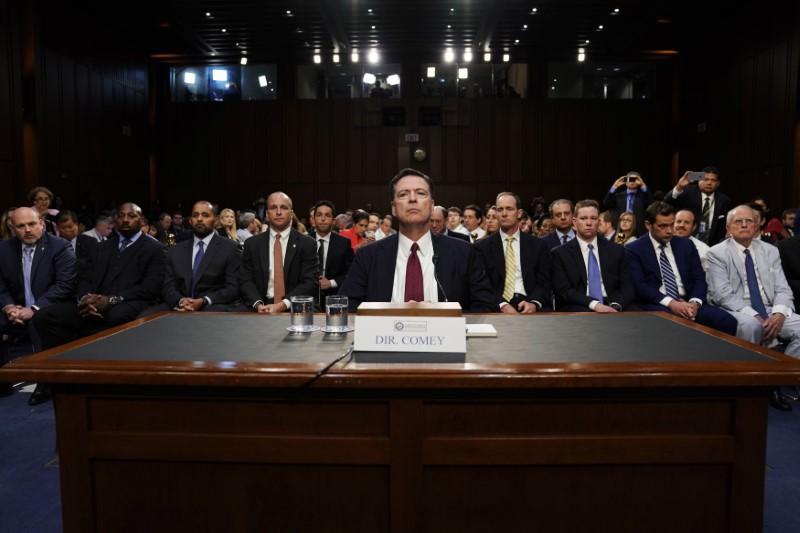By Patricia Zengerle and Dustin Volz
WASHINGTON (Reuters) - Leaders of the U.S. Senate Intelligence Committee said on Wednesday they had reached an agreement that would allow them to see memos written by former FBI Director James Comey about his meetings with President Donald Trump.
Comey's relationship with Trump has been central to ongoing investigations of Russian meddling in the 2016 U.S. election and whether there was collusion between Trump associates and Moscow. Lawmakers have raised questions about whether Trump fired Comey on May 9 in order to interfere with the Russia probe.
Russia has denied such assertions. Trump, a Republican, has dismissed them as sour grapes voiced by Democrats disappointed by his victory and called them a "witch hunt."
"We have a commitment to get appropriate access to the Comey memos," Senator Mark Warner, the ranking Democrat, told reporters at the Senate. "I'm pleased. I think it's critical information that we have to have as part of our review process."
He said he expected to have the memos "soon."
Warner declined to say much about the progress of the investigation or provide a timeline for when it might be concluded. "I would have thought we would have been further along, but I would never have expected the administration to fire Jim Comey. You can't make this stuff up," he said.
When asked, he said he expected that Trump's son-in-law and close adviser, Jared Kushner, would appear before the committee as promised despite having recently hired a lawyer.
Politico first reported that Richard Burr, the committee's Republican chairman, said the panel would be obtaining memos Comey wrote documenting his conversations with Trump.
COMEY TESTIMONY
Comey testified to the intelligence committee this month that he decided to keep detailed records because he felt so uncomfortable after meetings with the president that he feared Trump might lie about them.
The Russia investigations, by Department of Justice Special Counsel Robert Mueller and congressional committees, have dogged the first months of Trump's presidency and distracted from his policy goals such as repealing President Barack Obama's healthcare law.
Trump has also faced criticism from fellow Republicans as well as Democrats over his administration's failure to do more to investigate charges that Russia interfered in the 2016 U.S. election and concerns that it might do so again.
"Russia's our most dangerous adversary in the world today, and if he continues to refuse to act, it's a dereliction of the basic duty to defend the country," Nicholas Burns, an undersecretary of state under Republican President George W. Bush, testified to the Senate panel on Wednesday.
At a hearing last week that focused on the U.S. election, a Homeland Security official testified that Russian hackers targeted 21 U.S. state election systems in the 2016 presidential race and that a small number were breached.
Warner said the panel had asked officials in 21 states to release information about the hacking. "I do not see how Americans are made safer when they do not know which state elections systems Russia tried to hack," he said.
The probes have at times come up against Republican concerns about leaks of classified information and unproven assertions by Trump and others that Obama's administration improperly spied on Trump associates.

On Wednesday, Republican Senators Chuck Grassley and Lindsey Graham asked the FBI and Justice Department for copies of applications to the secretive Foreign Intelligence Surveillance Court for permission to conduct surveillance related to the election, including any related to the FBI’s ongoing Russia investigation.